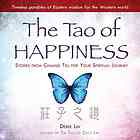
The Tao of Happiness
Stories from Chuang Tzu for Your Spiritual Journey
کتاب های مرتبط
- اطلاعات
- نقد و بررسی
- دیدگاه کاربران
نقد و بررسی

September 14, 2015
Lin (The Tao of Daily Life) retells 17 stories by the ancient Tao master Chuang Tzu (who lived in the fourth century B.C.E.), dividing them into four sections corresponding to the spiritual journey: Departure, Travel Advisory, Travel Tips, and Arrival. A longer section follows each story, explaining its meaning in terms of 21st-century Western life—for instance defeating archenemies such as a dead-end job or a codependent relationship. After one story, Lin writes that “the world is full of people who talk too much but say too little.... The Tao... expresses all possible meanings while saying nothing at all.... The sages aspire to convey more meaning using fewer words.” The stories themselves are well organized and insightful, but one wishes Lin had followed the sages’ advice and let the stories stand with far less explanation, so that readers could extract their own wisdom. Perhaps the answer is to read these fine stories without their interpretations, since their accompanying explanations often block the free-flowing power of the Tao.

November 15, 2015
Lin (The Tao of Joy Every Day, 2011) again demonstrates his skill as a cultural interpreter and guide to Chung Tzu's wisdom regarding daily life in any cultural context. Here he imparts 18 traditional stories that illustrate how to draw happiness from both the moment and one's ongoing life. Each of the brief chapters begins with a retelling of a fable ( The Frog in the Well, The Chef Cuts the Ox, The Dream of the Butterfly, etc.) followed by an equally brief discussion of how the chapter illustrates an element of the Tao and how to incorporate that element into the reader's attitude and actions. Vocabulary is simple and direct, and Lin's authorial voice gentle and familiar. While the entire book can easily be read in a single sitting, returning to a specific parable at relevant moments would be a likely method of keeping the reading of this an ongoing practice. A great choice for book discussion groups interested in Lao Tzu or Confucius.(Reprinted with permission of Booklist, copyright 2015, American Library Association.)

























دیدگاه کاربران